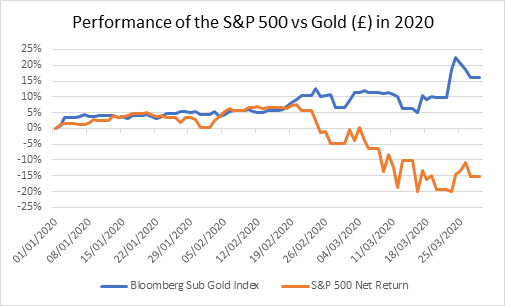
As the global economy continues to creak under the strain of the Covid-19 lockdown and cheap oil, investors could still benefit from adding gold as ballast to help stabilise their portfolio.
The Vix index, often dubbed the "fear index", which measures expected stock market volatility over the coming month, has spiked to record levels.
It is in seemingly “apocalyptic” moments such at this, that investors for centuries have sought refuge in gold. Within the spectrum of potential investments, gold stands apart. It holds little economic value and provides no cashflows, but it remains the ultimate time-tested, safe-haven asset.
Despite its recent rally, for those investing in British pounds the S&P 500 index remains down 15% year-to-date, while gold has climbed 16% over the same period. Even a small allocation to gold would have helped dampen the impact of tumbling equity markets in most investors’ portfolios.

The likelihood of further market turbulence, coupled with the massive stimulus packages announced by central banks across the globe, which impacts other safe-haven assets like government bonds, bodes well for gold. Even with a less bullish outlook, a low or negative correlation with other assets means that adding a small allocation will still likely boost risk-adjusted portfolio returns going forward.
How to Invest in Gold
While the thought of buying gold coins and hording them under your mattress might appeal at times of panic, the transaction and security costs - not to mention liquidity constraints of this approach - mean there are better ways to buy gold.
Buying a physically backed exchange-traded commodity (ETC) is the most efficient way for investors to access gold. ETCs are similar in structure to exhange-traded funds (ETFs), but due to their single commodity exposure do not meet diversity requirements need for "UCITs fund" status.
As their name suggests, these products use invested funds to directly buy gold, which is remotely stored in a secure facility. Importantly, investors can be reassured that their investment is physically underpinned by registered bullion.
The best performing of the main gold ETCs listed on the London Stock Exchange year-to-date is the WisdomTree Physical Swiss Gold ETC (SGBS), which charges an annual management fee of just 0.19%. As the name suggests, an investment in this product is backed by physical gold, which is stored in vaults in Zurich. It has tracked the spot price of gold closely since its 2009 inception and has been the stand-out option for buy-and-hold UK retail investors for some time. Over five years it has delivered annualised returns just shy of 10%.
Those who would rather have their gold kept closer to home can consider the Invesco Physical Gold ETC (SGLP), which invests in bullion housed in JPMorgan Chase Bank’s vaults in London. The fund cut its annual management fee to 0.19% in February 2020, making it the joint-cheapest option on the LSE.
Worth a mention, too, is Gold Bullion Securities ETC (GBSS). While this product has a high annual fee of 0.40%, it does come with an eye-catching benefit: investors in the ETC can withdraw funds directly in the form of physical gold coins. While this may be an attractive option to have, the associated costs mean that only under exceptional circumstances would an investor actually choose to exercise this right.





























